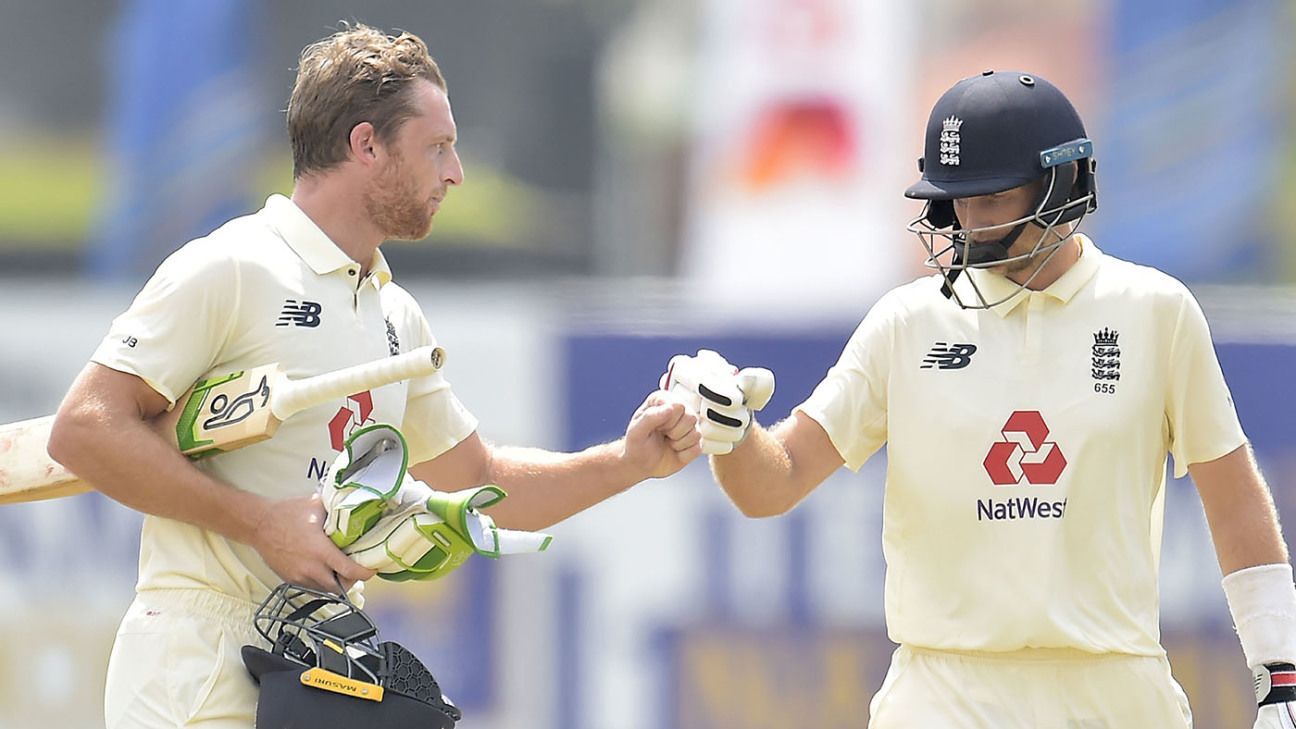Buttler was all praise for captain Joe Root’s ability to bat long periods against spin in the subcontinent
Only a handful of active cricketers know the feeling of winning a Test series in India. One of them is England captain Joe Root, who had debuted in the 2012-13 series which England won 2-1, the last time India were beaten in a series at home. As Root returns to India for his third tour – and for the first time as captain – all eyes are on him to lead the English challenge with the bat.
Root comes into the series with scores of 228 and 186 in Sri Lanka from earlier this month, where the visitors won 2-0; according to his team-mate Jos Buttler, for England to succeed in India, Root’s application against spin combined with his form will play a major role against a side that’s searching for its 13th straight Test series win at home.
“Joe’s always has a brilliant game against spin,” Buttler said on a conference from Chennai, where England are in a six-day quarantine before the first Test. “He’s one of the best exponents of the sweep shot and he picks length brilliantly, which is a big strength playing against spin. It’s very hard keeping dot balls against him because he manages to rotate the strike so well.
“He did that really well in Sri Lanka and one of the biggest things was his hunger to bat for a long period of time. I think he showed great application to bat both mentally, tactically and physically. To bat for so long and back it up across two Tests. He’s in great form and that’s a good place for him to be in. And for the team to learn from him.
“Joe was on that tour [of 2012-13] and he made his debut on that tour. He’ll have some fond memories and learnings from how that team was successful. That was one of the best England teams we had. This side is at a little different stage of that journey, but certainly getting to that point and trending in that direction.”
Buttler also said that batting for long periods would be key for England, having learnt the hard way the last time both sides played in Chennai. England made 477 after winning the toss in December 2016 but still lost by an innings. He admitted that the England batsmen need to learn quickly on what totals are considered satisfactory on Indian surfaces, compared to England where scores in the range of 300 are deemed competitive.
“There are times when the ball seams and swings in England and a big first-innings score can be 300,” Buttler said. “But in India, if it’s a fantastic batting wicket then a good score in the first innings is 600-650. Root was a good example of us doing that in Sri Lanka with a double hundred and a 180. He showed us that you have to make the most of your first innings.
“When we played India here four-five years ago, we scored 470, but India scored over 700 with Karun Nair scoring a triple-hundred. So it’s a great education about what comprises of ‘big first-innings runs’ in India and having the mindset and application in doing that.”
As for his personal goals as a wicketkeeper-batsman in Asia – a role he has played in only two series previously – Buttler was well aware of the challenges that Indian surfaces pose.
“Keeping wickets is a big challenge, the way it deteriorates for five days, less carry for the seam bowlers than what we know in England or South Africa or Australia,” Buttler said. “You need to stand closer, and the chances are very quick-reactive chances. And obviously, the challenge standing up to the spinners, with the pitches turning. But it’s also a great place to keep wickets because you feel like you’re always in the game. Wicketkeeping in spinning conditions is a lot of fun.”
On the topic of squad rotation, which England will be doing heavily through the all-format tour by resting certain players after the first two Tests, Buttler said it was unavoidable given the Covid-19 scenario and the additional stress it puts on players. While acknowledging that the issues for international cricketers appear insignificant when compared to those affected by the pandemic, he said that players spending prolonged periods in bio-bubbles and away from their families come with their own drawbacks which could have adverse effects on them.
Another drawback due to the six-day mandatory hotel-room quarantine is that England will have only three days of practice before the first Test – starting February 5 – against a side high on confidence after winning 2-1 in Australia without many senior players. But Buttler says that’s where the Sri Lanka tour played an important role.
“India will be very confident after the Australia tour and have a fantastic team but we come here with confidence from Sri Lanka, having played in conditions similar to India,” he said. “Considering we’ll have only three practice days, it’s good we’re a bit battle-hardened from the two Tests against Sri Lanka. India against England is a fantastic series. It’s one of the premier cricket series around the world.”
Sreshth Shah is a sub-editor at ESPNcricinfo
